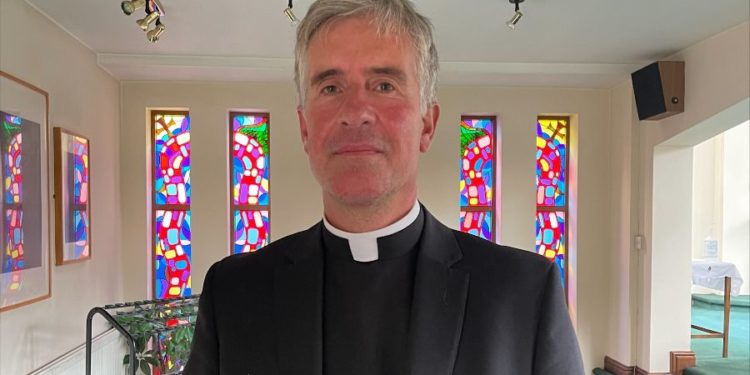“They referenced a tweet where I had referred to the proposed ‘assisted dying’ bill [introduced in Britain’s Parliament in May] as a bill to allow the NHS ‘to kill the vulnerable,’” Fr. Palmer told CNA via email in August.
“I was told it was fine for me to have this opinion, but they were concerned with how I expressed it. When I asked how they would suggest I express it, quite remarkably, they suggested I should call it ‘end of life care,’ which is a completely unacceptable policing of religious belief.”
Fr. Palmer also reported that the university objected to a tweet in which he had described abortion as the “slaughter of babies”.
A university spokesperson told CNA last month, “Our concern was not in relation to Fr. David’s views themselves, but the manner in which these views have been expressed in the context of our diverse community of people of many faiths.”
The priest told CNA that the university asked Bishop McKinney to provide an alternative priest, an invitation he declined.
The bishop had also appointed Fr. Palmer chaplain to Nottingham Trent University, which accepted the decision.
Fr. Palmer told CNA that he rejected Nottingham University’s explanation for its decision to deny him recognition.
“The university says they have ‘no issue with the expression of faith in robust terms,’ but this is precisely what they had an issue with,” he said.
He added: “The university claims to support ‘diversity and inclusion,’ but it appears that diversity only goes so far, certainly not as far as the Catholic chaplain being able to express ‘robustly’ mainstream Catholic beliefs.”
The University of Nottingham in November 2020 reached a settlement with a pro-life undergraduate student in a midwife program.
Julia Rynkiewicz, a 25-year-old Catholic, received an apology and payout after she was blocked from entering her program’s hospital placement phase after the university learned of her leadership of a pro-life student group.
(Story continues below)
The university overturned its decision, but Rynkiewicz sought an apology.
The British government introduced the Higher Education (Freedom of Speech) Bill earlier this year that could impose fines on universities if they fail to protect freedom of speech for students, staff, and visiting speakers.
The bill is currently at the report stage in the House of Commons.
In March 2018 a joint committee on human rights of the UK parliament noted troubling barriers to free speech at the nation’s universities, writing: “Whilst the original intention behind safe space policies may have been to ensure that minority or vulnerable groups can feel secure, in practice the concept of safe spaces has proved problematic, often marginalising the views of minority groups.”
“Minority groups or individuals holding unpopular opinions which are within the law should not be shut down nor be subject to undue additional scrutiny by student unions or universities,” the committee continued.
It added that “unless it is clearly understood that those exercising their rights to free speech within the law will not be shut down, there will be no incentive for their opponents to engage them in the debate and challenge needed to bring mutual understanding and maybe even to change attitudes.”
Credit: Source link



